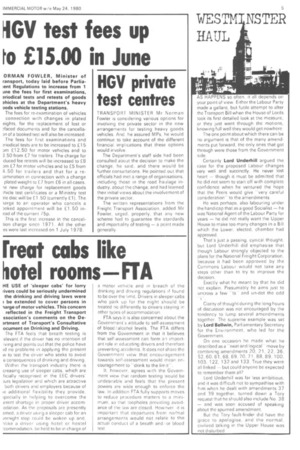WESTM NSTER HAUL
Page 7

If you've noticed an error in this article please click here to report it so we can fix it.
AS HAPPENS so often, it all depends on your point of view. Either the Labour Party made a gallant, but futile attempt to alter the Transport Bill when the House of Lords took its first detailed look at the measure, or they just went through the motions, knowing full well they would get nowhere_ The one point about which there can be no argument is that of the many amendments put forward, the only ones that got through were those from the Government side.
Certainly Lord Underhill argued the case for the proposed Labour changes very well and succinctly. He never lost heart — though it must be admitted that he did not seem to start off with complete confidence when he ventured the hope that the Peers would give -very careful consideration" to the amendments.
He was perhaps. also labouring under the handicap that as a good Socialist — he was National Agent of the Labour Party for years — he did not really want the Upper House to make too many changes in a Bill which the Lower, elected, chamber had approved.
That's just a passing. cynical thought, but Lord Underhill did emphasise that though Labour strongly objected to the plans for the National Freight Corporation, because it had been approved by the Commons Labour would not take any steps other than to try to improve the decision.
Exactly what he meant by that he did not explain. Presumably he aims just to uncross a few -tsand un-dot the odd
Clarity of thought during the long hours of discussion was not encouraged by the tendency to lump several amendments together. The supreme example was set by Lord Bellwin, Parliamentary Secretary for the Environment, who led for the Government.
On one occasion he made what he described as a -neat and logical"' move by combining amendments 20, 21, 22, 36, 52, 60, 61, 68, 69, 70, 71, 88, 89, 100, 103, 122, 132 and 133. True they were all linked — but could anyone be expected to remember them all?
Lord Underhill was far less ambitious, and it was difficult not to sympathise with him when he dealt with amendments 37 and 39 together, turned down a Tory request that he should also include No. 38 — and was SIDOTI accused of speaking about the spurned amendment.
But the Tory fault-finder did have the grace to apologise, and the normal, civilized talking in the Upper House was not disturbed
































































































































